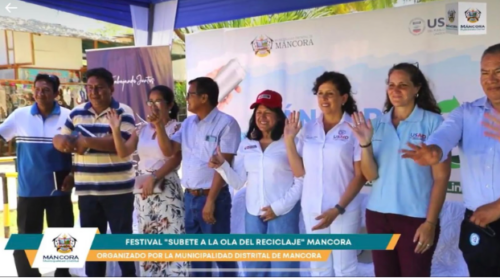The Festival “Máncora Recycles, Get on the wave of recycling”

Translated and cross posted from InfoRegion
On Saturday, February 18, the citizens of Peru’s northern district of Mancora, as well as national and international tourists participated in the Festival “Máncora Recycles, Get on the wave of recycling”, to promote the importance of recycling with the aim of reducing the 14 million tons of plastic entering the oceans every year.
The festival was organized by the U.S. Agency for International Development’s (USAID) Clean Cities, Blue Ocean program, and was attended by the Minister of the Environment, Albina Ruiz; the District Mayor of Mancora, Manuel Cruz; the Director of the Clean Cities, Blue Ocean program, Carla Cisneros; Environment Specialist Florencia Trama from USAID; the Director of Ciudad Saludable, Paloma Rondán; Tetra Pak representative, Carlos Vasquez; and the representative of the Association of Hoteliers Las Pocitas, Rafael Grisolle.
During the opening remarks, Mayor Manuel Cruz thanked USAID for their partnership, which has allowed the residents of Mancora to integrate recycling. “This program is a dream come true, we hope that we leave a healthy, orderly town, that goes in the direction we all want,” said the mayor.
Mancora Recycles
The Minister of the Environment, Albina Ruiz, invited everyone to “ride the wave of recycling.” She added that “programs like this are the ones we should have throughout the country including in the municipalities. While it is true that waste management is the responsibility of local governments, institutions (public and private) can help enhance that effort.” She pointed out that in Mancora only 40% of families are “separating” waste.
The Director of USAID’s Clean Cities, Blue Ocean program, Carla Cisneros, said that it is the neighbors who are implementing the program, “and that to generate change it is necessary that we all participate. We invite you to participate and become agents of change”.
Cisneros said that “this festival is the result of joint work from different actors: the local authority, sectoral authority, civil society, waste pickers’ organizations, private enterprise, but above all, the most important actors are the neighbors, men, women, and children who recycle within their communities.”
Paloma Rondán, Executive Director of Ciudad Saludable, said that today’s effort stems from the desire for environmental education to reach public spaces. “In Mancora there are environmental and circular enterprises available and with the business provided by the tourists they will continue to grow.” She also mentioned the participation of allied institutions, such as INFOREGION, CARE, WWF, among others.
Carlos Vasquez, representative of Tetra Pak, mentioned the circular economy, which has been promoted for many years, and for which education is the basis for recycling in the country. “Mancora today remains as a benchmark in the north to promote recycling nationwide.”
Finally, Rafael Grisolle, representative of the Association of Hoteliers Las Pocitas, said that the northern beaches are a tourist destination, noting “the tourist attractions of Mancora, and its natural attractions, such as the sea, whales, turtles, beaches, dry forest, the lagoons and, of course, the town, and the warm and friendly people.”
In that sense, hotels are concerned with the environmental deterioration of these tourist attractions. “We have many environmental problems and that is why we must applaud that something is being done through solid waste management. With both the municipality and the neighbors, together we will make the change,” he concluded.
ABOUT USAID’S CLEAN CITIES BLUE OCEAN PROGRAM
USAID’s Clean Cities, Blue Ocean program launched in August 2019 as the Agency’s flagship program to respond to the global ocean plastic pollution crisis under the Save our Seas Initiative. The five-year, $53 million global program works in ten priority countries to tackle ocean plastic pollution directly at its source. In Peru, USAID is designing and implementing holistic strategies that address each step in the waste value chain—from production to end use—prioritizing the most inclusive, economically viable, and environmentally sustainable solutions. The program leverages local, national, and international technical expertise, paired with its grants program to test, scale, and share locally-led, innovative, and proven solutions. Where possible, the program learns from and expands upon the success of proven initiatives by local government and non-governmental organizations.

